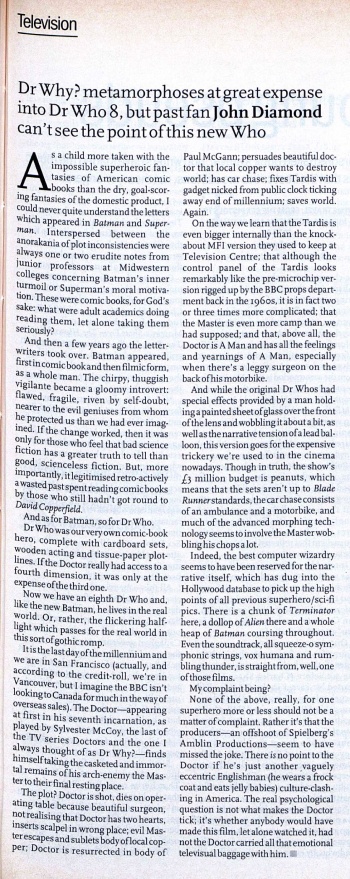Dr Why?
- Publication: New Statesman
- Date: 1996-05-31
- Author: John Diamond
- Page: 35
- Language: English
Dr Why? metamorphoses at great expense into Dr Who 8, but past fan John Diamond can't see the point of this new Who
As a child more taken with the impossible superheroic fantasies of American comic books than the dry, goal-scoring fantasies of the domestic product, I could never quite understand the letters which appeared in Batman and Superman. Interspersed between the anorakania of plot inconsistencies were always one or two erudite notes from junior professors at Midwestern colleges concerning Batman's inner turmoil or Superman's moral motivation. These were comic books, for God's sake: what were adult academics doing reading them, let alone taking them seriously?
And then a few years ago the letter-writers took over. Batman appeared, first in comic book and then filmic form, as a whole man. The chirpy, thuggish vigilante became a gloomy introvert: flawed, fragile, riven by self-doubt, nearer to the evil geniuses from whom he protected us than we had ever imagined. If the change worked, then it was only for those who feel that bad science fiction has a greater truth to tell than good, scienceless fiction. But, more importantly, it legitimised retro-actively a wasted past spent reading comic books by those who still hadn't got round to David Copperfield.
And as for Batman, so for Dr Who.
Dr Who was our very own comic-book hero, complete with cardboard sets, wooden acting and tissue-paper plot-lines. If the Doctor really had access to a fourth dimension, it was only at the expense of the third one.
Now we have an eighth Dr Who and, like the new Batman, he lives in the real world. Or, rather, the flickering half-light which passes for the real world in this sort of gothic romp.
It is the last day of the millennium and we are in San Francisco (actually, and according to the credit-roll, we're in Vancouver, but I imagine the BBC isn't looking to Canada for much in the way of overseas sales). The Doctor—appearing at first in his seventh incarnation, as played by Sylvester McCoy, the last of the TV series Doctors and the one I always thought of as Dr Why?—finds himself taking the casketed and immortal remains of his arch-enemy the Master to their final resting place.
The plot? Doctor is shot, dies on operating table because beautiful surgeon, not realising that Doctor has two hearts, inserts scalpel in wrong place; evil Master escapes and sublets body of local copper; Doctor is resurrected in body of
Paul McGann; persuades beautiful doctor that local copper wants to destroy world; has car chase; fixes Tardis with gadget nicked from public clock ticking away end of millennium; saves world. Again.
On the way we learn that the Tardis is even bigger internally than the knock-about MFI version they used to keep at Television Centre; that although the control panel of the Tardis looks remarkably like the pre-microchip version rigged up by the BBC props department back in the 196os, it is in fact two or three times more complicated; that the Master is even more camp than we had supposed; and that, above all, the Doctor is A Man and has all the feelings and yearnings of A Man, especially when there's a leggy surgeon on the back of his motorbike.
And while the original Dr Whos had special effects provided by a man holding a painted sheet of glass over the front of the lens and wobbling it about a bit, as well as the narrative tension of a lead balloon, this version goes for the expensive trickery we're used to in the cinema nowadays. Though in truth, the show's £3 million budget is peanuts, which means that the sets aren't up to Blade Runner-standards, the car chase consists of an ambulance and a motorbike, and much of the advanced morphing technology seems to involve the Master wobbling his chops a lot.
Indeed, the best computer wizardry seems to have been reserved for the narrative itself, which has dug into the Hollywood database to pick up the high points of all previous superhero/sci-fi pics. There is a chunk of Terminator here, a dollop of Alien there and a whole heap of Batman coursing throughout. Even the soundtrack, all squeeze-o symphonic strings, vox humana and rumbling thunder, is straight from, well, one of those films.
My complaint being?
None of the above, really, for one superhero more or less should not be a matter of complaint. Rather it's that the producers—an offshoot of Spielberg's Amblin Productions—seem to have missed the joke. There is no point to the Doctor if he's just another vaguely eccentric Englishman (he wears a frock coat and eats jelly babies) culture-clashing in America. The real psychological question is not what makes the Doctor tick; it's whether anybody would have made this film, let alone watched it, had not the Doctor carried all that emotional televisual baggage with him.
Disclaimer: These citations are created on-the-fly using primitive parsing techniques. You should double-check all citations. Send feedback to whovian@cuttingsarchive.org
- APA 6th ed.: Diamond, John (1996-05-31). Dr Why?. New Statesman p. 35.
- MLA 7th ed.: Diamond, John. "Dr Why?." New Statesman [add city] 1996-05-31, 35. Print.
- Chicago 15th ed.: Diamond, John. "Dr Why?." New Statesman, edition, sec., 1996-05-31
- Turabian: Diamond, John. "Dr Why?." New Statesman, 1996-05-31, section, 35 edition.
- Wikipedia (this article): <ref>{{cite news| title=Dr Why? | url=http://cuttingsarchive.org/index.php/Dr_Why%3F | work=New Statesman | pages=35 | date=1996-05-31 | via=Doctor Who Cuttings Archive | accessdate=29 May 2025 }}</ref>
- Wikipedia (this page): <ref>{{cite web | title=Dr Why? | url=http://cuttingsarchive.org/index.php/Dr_Why%3F | work=Doctor Who Cuttings Archive | accessdate=29 May 2025}}</ref>
